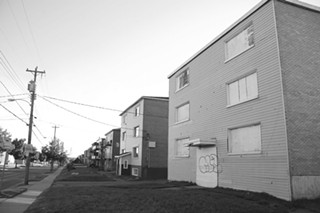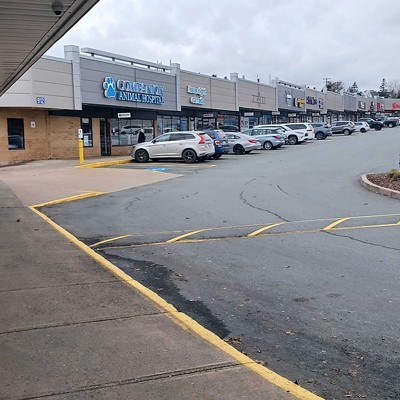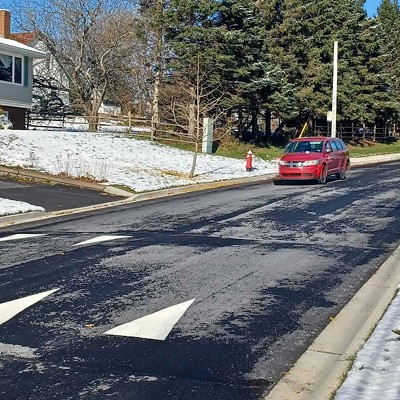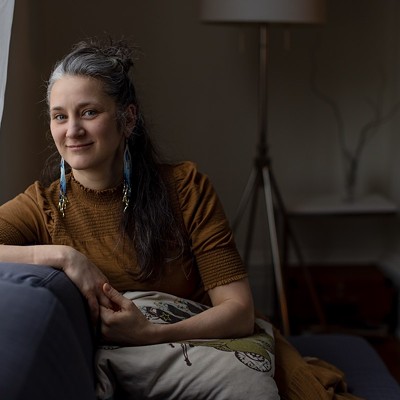On a chilly March morning outside the Hester Street Food Bank, two men load mismatched plastic bags of groceries into the back of a police cruiser. They climb into the back seat. There's no cage in this car, they joke. The officer driving laughs, says, "No, we're the touchy-feely guys." Every Wednesday morning constable Randy Wood, community police officer for Dartmouth North, shuttles people to and from food banks. He tries to remember the men's addresses as the car begins to roll through the cold, damp air.
"Seventy-six, right?"
"Eighty."
"Damn!"
The men in the car talk to Wood, tell him their stories. One man, middle-aged, shabbily dressed, talks about his son. Fifteen years old, the kid started running with a bad crowd, and ran himself all the way into the Jacksonville youth penitentiary. How do you deal with it, the man asks no one in particular. The kid doesn't listen to anyone but his friends.
"And I'm on my own here, I got my own problems."
But the boy's a good kid. No one in that car wants to see him in any more trouble.
It's another story in what some call the trauma of the north end. That trauma is poverty and the things that go hand-in-hand with it. Poor housing, drugs, crime.
A lot of single-parent families end up in Dartmouth North.
It's really sad, the cop says.
Before starting his job last August, Wood had no idea how people got to and from the food bank. It was simple. They walked, sometimes for miles. The community police officer works with the neighbourhood to reduce crime, sitting on boards, trying to bring residents and police together. The people he drives home from the food bank usually are unemployed. Many suffer from mental illness. The "village cop" looks out for them, tries to find them help if they want it.
Most of the people climb from the cruiser north of Albro Lake Road in Highfield or Pinecrest. It's one of the most crime-ridden, densely populated, impoverished areas of the Halifax Regional Municipality. Nobody meant for it to turn out like this. The ghetto-ization of Highfield-Pinecrest is the result of urban planning foul-ups that took place over decades. And for the past 10 years, no level of government has taken responsibility for fixing it.
Today, about nine out of 10 residents in Highfield-Pinecrest rent. Three out of four spend more than a third of their income paying it. The average family income is barely half the average for the municipality. While a Halifax family relies on about $65,000 a year, a Pinecrest Drive family gets by on less than $35,000. Nearly one in three families in Highfield-Pinecrest classify as low-income—more than three times the municipal average. Twice as many are single-parent families. Most of these parents are women living with their children on just over $19,000 a year.
As a result of poverty, drugs, weapons and crime have become problems, says Dartmouth North MLA Trevor Zinck, who ran a citizens' association there for years before his 2006 election.
Halifax Regional Police report significant incidents on their website each day. Analysis shows that of 232 muggings, robberies and home invasions reported last year, 57 took place in Dartmouth North, between Dahlia Street and the Circumferential Highway west of Highway 111. More than half of those occurred in Highfield-Pinecrest. More than a quarter of the 11 assaults in North Dartmouth took place in that community, which also saw a homicide, a violent sexual assault and several shootings and stabbings.
It's gotten to the stage, says Zinck, where some of those people are afraid to go out after dark.
Michael Fleet doesn't leave his Pinecrest Drive apartment at night. Come sunset, he's in for good. The Sobeys maintenance manager moved here 18 months ago for the cheap rent after a cancer diagnosis forced him to take time off work. Most of the trouble is kids, he says. He hasn't had any incidents but he knows that they happen.
"There were shootings here in the wintertime. There's robberies, drugs, that sort of stuff."
It shouldn't come as a surprise, says Zinck. You have a concentration of people in an area that's isolated from the rest of the city. People are poor and there are few services for them. Kids have little to do and bear the stigma that comes with growing up in a "ghetto-ized" neighbourhood. Some of them lose hope.
"It takes a lot of supports to be put in place to help a child break out of that. And we just haven't had enough successes. But it's scary as hell that there are individuals between 14 and 21...who feel they need to carry weapons because they've sought out a lifestyle that they feel is the only lifestyle they can obtain."
Dave Carter and Brian LeBlanc, executives of the District 9 Citizens' Association, are quick to point out the many good things about the neighbourhood. It's something the media doesn't do much of. But like so many areas that struggle with poverty and crime, people stick together through it and put in countless hours to make it better. There's a community newspaper that was launched to combat negative media attention and stigma and there's an effort to revitalize Farrell Hall, a community-owned recreation facility that used to be a social hub. There's a community march against violence each year to Jason MacCullough Park, named in memory of a young man murdered there nearly seven years ago, and there's the Dartmouth Community Centre. With a yearly cleanup, an active Neighbourhood Watch group and Citizens on Patrol, residents are doing their best to improve the situation.
The common experience of stigma is part of what makes the community so strong, says LeBlanc. "This is a vibrant community, people will really bond together when there's a common cause. The place where I feel most at home, where I feel the strongest sense of community, is here in Dartmouth North."
Al Watts built some of those buildings that are now blamed for the area's deterioration. The engineer has called Pinecrest home for more than nine years. There are problems like anywhere else. There are drugs. But Watts thinks it's far more peaceful than you'd believe from the news. "There's no question that there's spots around here that should be cleaned up," he says. "But I think some of it's just totally overblown."
But cruise down Highfield Park Drive and you'll see little along the 1.5-kilometre strip except low-rise apartments, a couple convenience stores and no fewer than eight rental office signs. To the southeast, the buildings—many of which are boarded up—are older, smaller, with a few houses sprinkled in between. Some have metal grates on every window.
"If you drive through the neighbourhood, you know that's planning and development gone awry," says Jerry Pye, who represented the neighbourhood for nearly 20 years as alderman and later MLA. "That sort of thing should never be allowed to exist."
It wasn't always like this. Long ago, Pinecrest was the place to live.
When Pye moved to Pinecrest in 1966, it was all homes built during the Second World War housing crisis. But zoning laws allowed for apartment buildings and they began sprouting up. By the time the area was re-zoned in the 1980s to stop more development, there were fewer than 130 houses left. The buildings weren't always maintained. When Gloria McCluskey was Dartmouth's mayor in the 1980s, she got so frustrated with the disrepair that she invited reporters on a tour of rundown buildings in Pinecrest.
"There was a building with snow coming in the windows," McCluskey, now a city councillor for central Dartmouth, remembers. "The landlords allowed them to deteriorate, they got tenants who didn't care and they just went to pieces." As those doors slammed shut on further development in Pinecrest, along came Highfield Park.
"And that," says McCluskey, "was not a good plan."
The rows of apartments in Highfield were not intentional. In the late 1980s, the area was re-zoned to allow commercial use, things like hotels, offices, stores and a couple apartments. It was supposed to be a mixed neighbourhood, says Jill Grant, director of Dalhousie University's school of planning. It was to serve as a buffer between the industrial park and residential Pinecrest.
"The idea was a mix of uses which would be very vibrant and create a special kind of place," says Grant.
But when the land went to market, no one wanted to develop commercial. Everyone wanted to build apartments. And there was nothing the city could do to stop the explosion. HRM's planning department estimates that 1,500 apartment units flew up between 1988 and 1993 while almost none of the anticipated commercial development took place. There was a housing glut. Rent prices dropped and brought more low-income people to the neighbourhood. Buildings in Pinecrest emptied as tenants flocked to the newer units in Highfield.
"It's created a number of problems, not just for the city but for those who live there, of very high density and the concentration of poverty," says Grant. "I know planners never in their wildest dreams expected there to be that level of housing. So it's kind of a tragedy."
The City of Dartmouth commissioned a neighbourhood plan, completed in 1991, to identify problems created by the development. The 10-year plan recommended improvements to Highfield-Pinecrest, including everything from sidewalks, daycares and streets to hiring a community development worker and tree-planting. A lot of that work was done. New zoning slowed the apartment eruption and allowed for houses. Sidewalks and trees went in, a community centre was built.
But after amalgamation in 1996, the responsibility for social assistance and social services went to the province, while the city took over policing and streets. "It's not that the city doesn't care. It's that the responsibility was exchanged," says social planner Barb Nehily. The new houses never came. And more than a decade later, the rates of crime, transience and poverty are nearly identical to 1991.
Roger Wells, HRM's supervisor of regional and community planning, says it's time to revisit Highfield-Pinecrest. There are things that could be done. The city could encourage landowners to maintain their buildings with maintenance and landscaping grants. The other area to work on, he says, is social issues. "We're not ignoring North Dartmouth," he says. "But we also readily admit that much more could be done and much more attention needs to be paid to it."
Developers must consult more with the public now and council has more power to negotiate what developments take place. The loopholes that allowed for Highfield have been patched up. It doesn't make everyone happy, says Wells, but there are more efforts to address community concerns. And lessons have been learned from neighbourhoods such as Highfield-Pinecrest.
"Affordable housing is absolutely important," says Wells. "But you don't put it all in one area, you don't create a ghetto-nation of low-income housing anymore."
Huge developments are still going up across the city in Spryfield and Clayton Park, though. A number of new apartments were recently approved for Dartmouth despite protestations from many community members. The answer to old problems from old developments is money, says Zinck. Community police and beat cops have reduced crime in Highfield-Pinecrest but it's not a solution. Social assistance payments must increase and kids must get more recreational activities and support. Until people are no longer living in the poverty they are today, crime won't stop, he says.
Zinck and Pye continue arguing against further mass development of low-income housing, particularly in areas that already have more than their fair share—like Dartmouth North.
"What we've done is we've bascially gone out and said to people, these are the only areas you can live in based on the financial situation," he says. "It's sad that we've done that. How do we change it? We make people aware of it. We stand up and say we can't take this anymore."
Jess McDiarmid is a recent graduate of the University of King’s College journalism program.















